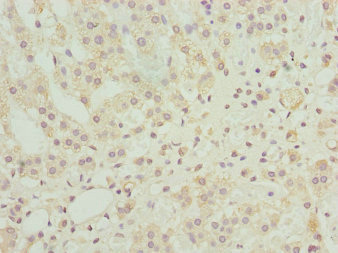NINL Antibody
-
中文名稱:NINL兔多克隆抗體
-
貨號:CSB-PA896492ESR2HU
-
規(guī)格:¥440
-
促銷:
-
圖片:
-
其他:
產(chǎn)品詳情
-
產(chǎn)品名稱:Rabbit anti-Homo sapiens (Human) NINL Polyclonal antibody
-
Uniprot No.:
-
基因名:
-
別名:NINL antibody; KIAA0980 antibody; NLP antibody; Ninein-like protein antibody
-
宿主:Rabbit
-
反應種屬:Human
-
免疫原:Recombinant Human Ninein-like protein (1-190AA)
-
免疫原種屬:Homo sapiens (Human)
-
標記方式:Non-conjugated
-
克隆類型:Polyclonal
-
抗體亞型:IgG
-
純化方式:Antigen Affinity Purified
-
濃度:It differs from different batches. Please contact us to confirm it.
-
保存緩沖液:PBS with 0.02% sodium azide, 50% glycerol, pH7.3.
-
產(chǎn)品提供形式:Liquid
-
應用范圍:ELISA, IHC
-
推薦稀釋比:
Application Recommended Dilution IHC 1:20-1:200 -
Protocols:
-
儲存條件:Upon receipt, store at -20°C or -80°C. Avoid repeated freeze.
-
貨期:Basically, we can dispatch the products out in 1-3 working days after receiving your orders. Delivery time maybe differs from different purchasing way or location, please kindly consult your local distributors for specific delivery time.
相關產(chǎn)品
靶點詳情
-
功能:Involved in the microtubule organization in interphase cells. Overexpression induces the fragmentation of the Golgi, and causes lysosomes to disperse toward the cell periphery; it also interferes with mitotic spindle assembly. May play a role in ovarian carcinogenesis.
-
基因功能參考文獻:
- Upon UVC radiation, Nlp interacts with XPA and ERCC1, and enhances their association PMID: 26805762
- these data support a model where CC2D2A associates with NINL to provide a docking point for cilia-directed cargo vesicles, suggesting a mechanism by which transition zone proteins can control the protein content of the ciliary compartment. PMID: 26485645
- Overexpression of ninein and the ninein-like protein NIP induces fragmentation of the Golgi and causes lysosomes to disperse toward the cell periphery. PMID: 16254247
- Breast cancer patients with high expression of Nlp were likely resistant to the treatment of paclitaxel. PMID: 22353935
- This review summarises our current knowledge of physiological roles of Nlp, with an emphasis on its potentials in tumourigenesis. PMID: 21505454
- findings demonstrate that Cdc2/cyclin B1 is a key regulator in maintaining appropriate degradation and subcellular localization of Nlp, providing novel insights into understanding on the role of Cdc2/cyclin B1 in mitotic progression PMID: 20890132
- regulation of Nlp by Aurora B is critical for the completion of cytokinesis, providing novel insights into understanding the machinery of cell cycle progression. PMID: 20864540
- Nlp abnormalities may contribute to genomic instability and tumorigenesis and might serve as a potential biomarker for clinical diagnosis and as a therapeutic target. PMID: 20093778
- results indicate that ninein-like protein expression is cell cycle-dependent and regulated by anaphase-promoting cyclosome complex-mediated protein degradation PMID: 17403670
- Overexpression of Nlp in ovarian tumors raises the possibility that Nlp may play a role in ovarian carcinogenesis. PMID: 18538832
- Nlp(isoB)interacts with USH2A and lebercilin. PMID: 18826961
- BRCA1 interaction of Nlp might be required for the successful mitotic progression, and abnormalities of Nlp lead to genomic instability. PMID: 19509300
- Nlp overexpression might contribute to the development of head and neck squamous cell carcinoma PMID: 19724857
顯示更多
收起更多
-
亞細胞定位:Cytoplasm, cytoskeleton, microtubule organizing center, centrosome. Cytoplasm. Note=In interphase cells, NINL is transported to the centrosomes by the dynein-dynactin motor complex (PubMed:16254247). During centrosome maturation, PLK1 directly phosphorylates NINL resulting in its release into the cytoplasm (PubMed:16254247).
-
組織特異性:Expressed in KYSE-150 esophageal carcinoma, HeLa cervical carcinoma and U2OS osteosarcoma cells. Expression is regulated in a cell cycle-dependent manner and peaks during G2/M phase (at protein level). Expressed in fetal heart, skeletal muscle, liver, lun
-
數(shù)據(jù)庫鏈接:
Most popular with customers
-
YWHAB Recombinant Monoclonal Antibody
Applications: ELISA, WB, IF, FC
Species Reactivity: Human, Mouse, Rat
-
-
-
-
-
-
-






















